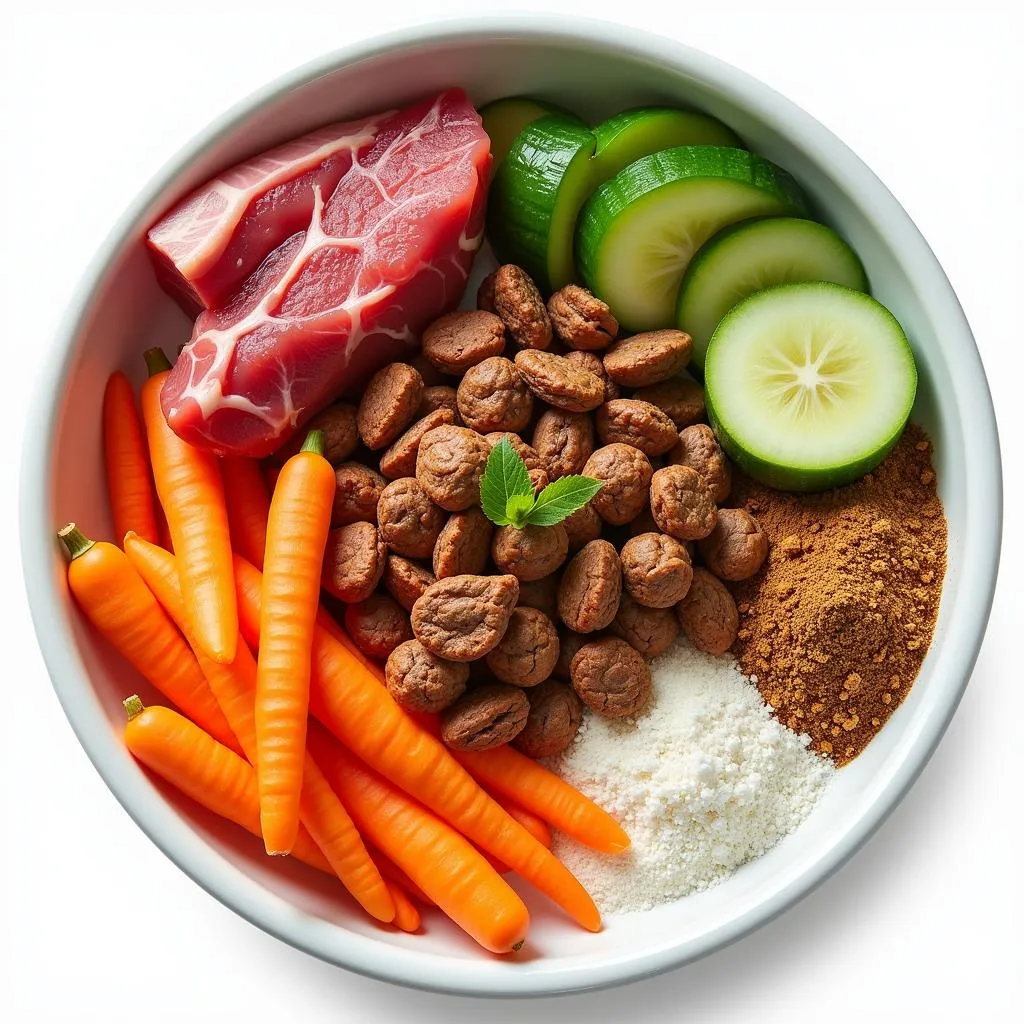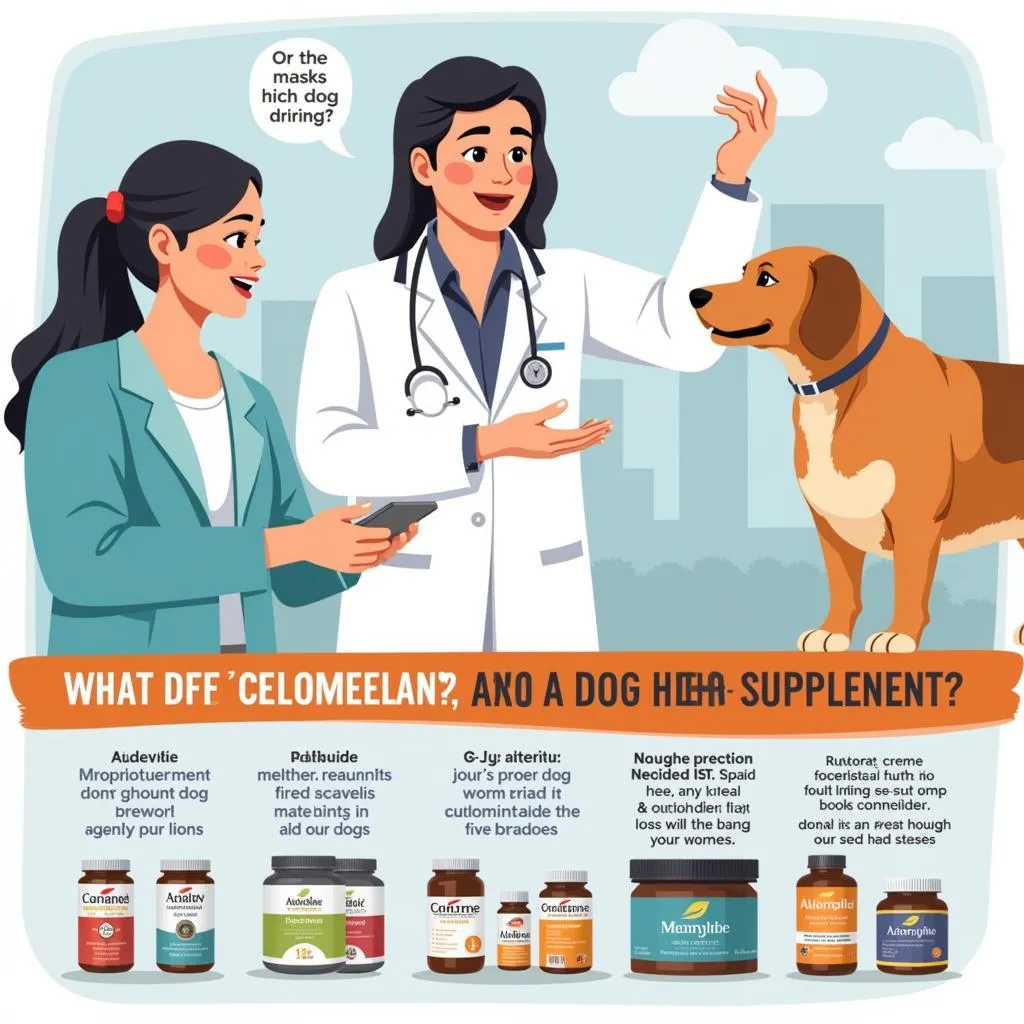Switching to homemade dog food can be a great way to provide your furry friend with a healthier and more personalized diet. However, it’s crucial to ensure your homemade meals are nutritionally balanced, which is where Dog Vitamins For Homemade Dog Food come into play. Providing the right supplements can help bridge any nutritional gaps and ensure your canine companion thrives on their new diet.
 Dog food ingredients arranged in a bowl
Dog food ingredients arranged in a bowl
Why are Dog Vitamins Important for Homemade Dog Food?
While fresh, whole ingredients are the foundation of a healthy homemade dog food diet, it can be challenging to consistently meet all of your dog’s nutritional needs through food alone.
Here’s why:
- Nutritional Variations in Ingredients: The nutrient content of ingredients like meat and vegetables can fluctuate depending on factors like sourcing, seasonality, and preparation methods.
- Potential for Imbalances: Without careful planning and calculations, homemade dog food might lack essential vitamins, minerals, and fatty acids, leading to nutritional deficiencies over time.
- Individual Needs: Different breeds, ages, and activity levels require varying amounts of specific nutrients.
Using dog vitamins designed for homemade dog food provides a safety net, ensuring your dog receives a balanced and complete diet tailored to their individual needs.
Key Nutrients to Consider
When choosing dog vitamins for homemade dog food, look for a comprehensive formula that includes the following essential nutrients:
- Vitamins: A, D, E, K, and B vitamins are crucial for various bodily functions, including vision, bone health, immune function, and energy metabolism.
- Minerals: Calcium, phosphorus, magnesium, zinc, iron, and iodine are vital for bone development, muscle function, thyroid health, and overall well-being.
- Omega-3 Fatty Acids: Found in fish oil and other sources, omega-3s support healthy skin and coat, reduce inflammation, and promote cognitive function.
 A veterinarian talking to a dog owner about supplements.
A veterinarian talking to a dog owner about supplements.
Choosing the Right Dog Vitamins
With countless dog vitamin options available, selecting the right one can seem daunting. Here are some factors to consider:
- Life Stage: Puppies, adults, seniors, and pregnant or lactating dogs have different nutritional requirements. Choose a formula specifically designed for your dog’s life stage.
- Health Conditions: If your dog has any health concerns, consult your veterinarian for recommendations on vitamins that address their specific needs.
- Quality and Sourcing: Opt for high-quality vitamins from reputable brands that use bioavailable forms of nutrients and undergo rigorous testing.
- Form and Palatability: Vitamins come in various forms, including chews, powders, and liquids. Choose a form your dog readily accepts to ensure consistent intake.
Integrating Vitamins into Homemade Dog Food
Once you’ve selected the appropriate vitamins, follow these tips for seamless integration into your dog’s diet:
- Start Slowly: Gradually introduce the vitamins to avoid digestive upset. Begin with a smaller amount than recommended and increase it gradually over a week.
- Mix Thoroughly: Ensure the vitamins are evenly distributed throughout the food to prevent your dog from picking them out.
- Monitor Your Dog: Observe your dog for any adverse reactions, such as digestive issues or allergic reactions. Contact your veterinarian if you notice any concerns.
Raw Dog Food Supplement
Adding a raw dog food supplement to your dog’s diet can provide additional nutritional benefits. Raw food supplements often contain ingredients like:
- Uncooked Muscle Meat: A rich source of protein and essential amino acids.
- Organ Meat: Packed with vitamins, minerals, and enzymes.
- Raw Bones: Provide natural calcium and other minerals.
 A happy dog eating food from a bowl.
A happy dog eating food from a bowl.
Consult Your Veterinarian
It’s crucial to consult your veterinarian before making any significant changes to your dog’s diet, including introducing new vitamins or supplements. They can:
- Assess Your Dog’s Nutritional Needs: Based on their breed, age, activity level, and health history.
- Recommend Appropriate Vitamins: Tailored to your dog’s specific requirements.
- Monitor Their Progress: Regular checkups can help ensure your dog’s nutritional needs are being met.
Conclusion
Homemade dog food can be a labor of love that provides numerous benefits for your furry companion. By incorporating high-quality dog vitamins specifically designed for homemade diets, you can confidently nourish your dog with delicious and nutritionally balanced meals. Remember to consult your veterinarian for personalized guidance and ensure your dog thrives on their homemade diet.
FAQ About Dog Vitamins for Homemade Dog Food
1. Can I use human vitamins for my dog?
No, human vitamins are not formulated for dogs and can be toxic in certain dosages.
2. How much of each vitamin does my dog need?
The specific dosage varies depending on the vitamin, your dog’s weight, age, and health status. Always follow the instructions on the product label or consult your veterinarian.
3. What are the signs of vitamin deficiency in dogs?
Common signs include dull coat, hair loss, dry skin, lethargy, loss of appetite, digestive issues, and weakened immune system.
4. Can I give my dog too many vitamins?
Yes, over-supplementation can lead to health issues. Always follow the recommended dosage.
5. Where can I buy dog vitamins for homemade dog food?
You can find them at pet stores, online retailers, and your veterinarian’s office.
Looking for more helpful tips and recipes for your furry friend? Check out our articles on Dog Food Breakfast and Crockpot Dog Food Ground Turkey.
For further assistance or personalized advice, our dedicated customer support team is available 24/7. Reach us at Phone Number: 02437655121, Email: [email protected] or visit us at 3PGH+8R9, ĐT70A, thôn Trung, Bắc Từ Liêm, Hà Nội, Việt Nam.